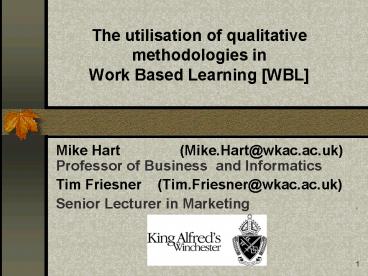The utilisation of qualitative methodologies in Work Based Learning WBL
1 / 16
Title:
The utilisation of qualitative methodologies in Work Based Learning WBL
Description:
1. The utilisation of qualitative methodologies in. Work Based Learning [WBL] ... Experienced interviewers listen with an inner ear' ... –
Number of Views:24
Avg rating:3.0/5.0
Title: The utilisation of qualitative methodologies in Work Based Learning WBL
1
The utilisation of qualitative methodologies in
Work Based Learning WBL
- Mike Hart (Mike.Hart_at_wkac.ac.uk)
Professor of Business and Informatics - Tim Friesner (Tim.Friesner_at_wkac.ac.uk)
- Senior Lecturer in Marketing
2
Qualitative Methodology in degree programmes
- Most social science courses will contain
elements of qualitative methodology - Business studies courses typically include-
quantitative methods- often survey analysis
techniques- rarely qualitative methodology per
se
3
Work Based Learning components
- Middlesex Universitys National Centre for Work
Based Learning indicates that - Recognition and Accreditation of Learning RAL
earns credit (portfolio) - Programme Planning informs a Learning Agreement
- Research Methods helps underpin
- Work Based Project is written/defended
4
Traditional work placements
- Include a synoptic report in which the
organisation and their own role within it is
analysed - Students are encouraged to keep field-notes as
an ethnographer - Critical self-reflection has always been
difficult to write
5
Tools of Qualitative Analysis- Ethnography
- Anthropological roots of I am a camera
- Phenomenological mode of understanding the
common sense knowledge of an organisation - Latterly, thick descriptions are deployed which
contextualise experience
6
Tools of Qualitative Analysis- Observation
- What to observe? (social interactions, policies
and procedures) - Observation notes (what I saw)
- Methodological notes (how I collect data)
- Theoretical notes (hunches, hypotheses)
- Personal notes (own feelings)
7
Tools of Qualitative Analysis- Interviewing
- Questionnaire schedules often criticised
- Experienced interviewers listen with an inner
ear - Problems of how to record and transcribe data
- Interview analysis needs coding frame
- Interviews as a source of quotes
8
Tools of Qualitative Analysis- Documentary
Analysis
- Abundant sources of data within organisations
- Skills associated with a historian are required
(provenance, context) - Should be subject to content analysis in which
themes can be categorised (and perhaps measured)
9
Tools of Qualitative Analysis- Case Study
- Intensive study best utilised? to generate
hypotheses (induction)? examination of social
processes in depth - Description can crowd out analysis (particularly
in student projects) - Transferability of findings is problematic
10
Tools of Qualitative Analysis- Integrated
approaches
- Howard Beckers (How I learnt what a crock was)
is an interesting example of how several
approaches may be combined - Quantitative and qualitative methodologies may be
combined to give representativeness as well as
ecological validity
11
Deployment in WBL deep learning
- De facto role as participant observers encourages
deep learning (even in routinised jobs) - Seeking out the questions to ask is one skill to
be acquired - Even short attachments (50-60 days) can give
benefits
12
Deployment in WBL self-reflection and learning
styles
- Draws on work of the reflective practitioner
- Students may utilise any of the following
- - Belbin
- - Honey and Mumford
- - Demings PDCA cycle
- Students find self-reflection difficult
13
Deployment in WBL Personal Development Planning
- QAA has argued for PDP for each student- become
more effective learners- understand how they are
learning- improve general skills for
management- articulate personal goals-
encourage positive attitude to learning - QAA Websitehttp//www.qaa.ac.uk/crntwork/progfil
eHE/contents.htm
14
Deployment in WBL Preparation of reports and
portfolios
- At the conclusion of WBL a defensible claim has
to made for academic credit (in the form of a
learning journal or placement report) - Methodological expertise needs to be demonstrated
in these reports - Epistemological issues now achieve some
prominence for students - Generic skills useful for Final Year Projects
15
Ecological Validity
- The term is used by qualitative researchers to
enhance the inter-relationships of factors in
naturalistic settings - Students should be encouraged to adopt this frame
of reference (e.g.relating work patterns to
socio-economic factors) - Caution should be exercised on extent to which
experiences are generalisable
16
Conclusions
- Qualitative methods have a particular salience
for Business Studies students undertaking WBL - Even casualised work can present excellent
learning opportunities - E-learning now facilitates good practice
- King Alfreds work experience website
- http//www.wkac.ac.uk/business/we/































